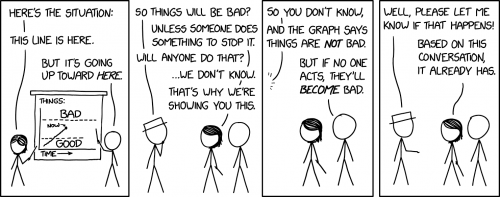Pay attention, Republicans. I know this is what you want.
Florida’s New College has had a rocky time since DeSantis was elected governor. He hates the liberal arts university, and placed a lot of anti-education administrators in charge — first and foremost, that execrable hack Chris Rufo, straight from the anti-science propaganda outlet, the Discovery Institute.
But first, some good news! Enrollments are up.
The incoming freshman class, which is the largest in New College’s history, will include at least 341 students; 155, or just under half, are student athletes, according to university spokesperson Nathan March.
That is very good news. I know my university has suffered with low enrollments for the past few years, thanks to the pandemic. My upper-level course enrollments are still looking worryingly low this year, but my freshman class is having a surge, which is promising for the future. I’d say this also promises excellent prospects for New College, except…
They seem to be using athletics to lure in new students. Student athletes are great, well-rounded students for the most part, so that’s not intrinsically bad, but the question is whether the new class is appropriately focused. We have lots of student athletes at UMM too, but they know their primary goal is to get an education. Is that true for new students attracted to New College?
I also wonder, given the notoriety of the changes Florida Republicans have been imposing, how many of these new students are right wing goons seeing an opportunity to undermine a liberal arts university.
Another problem: they don’t seem to have planned ahead. They’ve got more first year students, but no place to put them, so they’ve booked an off-campus hotel to house the surplus.
Students first heard in June that there was a chance their housing contracts, which were finalized in April, could change, according to a Tampa Bay Times article from July. Apartments typically reserved for juniors and seniors would now house the more than 100 new student athletes New College had admitted for the fall.
The remaining students are being squeezed into the other dorms on campus—except for a number of rooms that are offline due to mold and other structural problems—or being asked to live in a nearby hotel, the Home2 Suites by Hilton Sarasota Bradenton Airport, if they cannot secure their own off-campus housing. The college has rented out the entire Home2 Suites for the semester, totaling 133 beds, according to the contract between the institution and the hotel.
Oops, there’s the student athletes getting priority again. The hotel is a mile off campus, requiring students to walk along a busy highway to get to class.
Students placed in the Home2 Suites hotel worry about how they will commute to and from New College, about a mile away. For those without vehicles, the journey consists of a 15-minute walk largely along a stretch of busy highway. Parents and faculty have also complained that high levels of crime make the area unsafe, especially at night. While a shuttle is available, it is infrequent—running hourly until 11 p.m.—and can only carry a handful of passengers.
“They don’t seem to be able to plan ahead very well at all,” said Hannah Galantino-Homer, whose son was assigned to live in the Home2 Suites, although he had already decided to transfer out of New College by the time he got the news a few weeks ago. “Like, you don’t think people need to be on campus after [11]?”
This is a huge coordination and planning problem. If your enrollments are over your capacity, the responsible thing to do is tighten up your admission requirements and get the numbers down to what you can handle. Recruiting lots of students mainly on their athletic ability is not a great long-term solution.
I haven’t even gotten to their big problem yet: they’re hemorrhaging faculty.
When a committee of the New College of Florida Board of Trustees met in July, a whopping 36 faculty members had already left since Florida Governor Ron DeSantis initiated a conservative restructuring of the institution in January. That number has subsequently grown to more than 40, Amy Reid, the sole faculty member on the board, told Inside Higher Ed.
Now, as students prepare for the fall semester, the impact of the faculty exodus is becoming apparent: many classes won’t be offered at New College this term.
The course catalogue was already sparse when students first began looking at classes last spring. Dani Delaney, the mother of one former New College student who is transferring to Hampshire College in Massachusetts—which guaranteed admission to all New College students in good standing—said her son could only find two classes that counted towards his “area of concentration” (which is what New College calls majors). When he contacted the institution about the lack of relevant courses, she said, he was told the course catalogue was “in flux” and to “choose something else.”
This is a disaster for a small university, where we’re often operating on the knife’s edge of staffing.You need a critical mass of diverse skills to properly teach a discipline. For instance, our physics department lost two faculty to retirement, leaving one person to teach everything (we didn’t plan far enough ahead), which is not viable. We were frantically scrambling to hire short term faculty while trying to get approval to hire tenure-track replacements. I can’t imagine what the New College departments are doing, adding the abrupt losses to the fact that New College is not an attractive venue for the best new faculty. On top of that, they’re disorganized and using political ideology to wreck programs.
“For neuroscience, there’s only one elective beyond the introductory level right now, which is not healthy,” Leininger said, noting that the number of faculty in NCF’s neuroscience program has declined from three to one. “The number of choices students have this year is drastically reduced … if one of those classes conflicts with another class they have to take that is completely required, they’re going to have trouble staying on track for their major.”
Leininger said she received permission from her new institution to teach New College’s neurobiology course over Zoom—a plan the NCF administration at first seemed to embrace. In an email to Leininger that she shared with Inside Higher Ed, Bradley Thiessen, the college’s interim provost said he would “advocate” for her to teach the course if she was willing and able to do so.
But about two months later, she got word from NCF that she would not be allowed to teach the class, for reasons that were not explained. She suspects it may have something to do with her outspoken opposition to the direction DeSantis and the board are taking the institution, which has included speaking to the media about her decision to leave and reposting criticisms of the administration on X.
That’s what happens when you let incompetent hacks take charge. They’re losing the confidence of the students and their parents, too.
Dani Delaney’s son, a rising sophomore, decided he wouldn’t return to New College this semester in large part because he felt uneasy about the university’s decision to walk back the housing assignments students chose last spring.
He replied to multiple emails from the residential life department saying he wouldn’t be attending in the fall. Nevertheless, he received a notice on Aug. 9 telling him he had forfeited his spot in campus housing by failing to respond.
“I thought, ‘Oh my god, how many other people might have gotten that same email of, hey, basically, you’re on your own, kid,” Delaney said. “It just shows that they have not committed to what’s in the best interest of the student body. It’s so wrong, the way they’ve gone about it. The disorganization—I can’t wrap my brain around it. This is not how you run a college.”
I wonder how many of those new enrollments will still be there in a year or two? How many will be able to successfully graduate?
There might be a bit of climate shock moving from Florida to Minnesota, but we’d welcome any transfer students who’d like to attend a stable, reliable university, with the capacity to handle them and also the responsibility to provide a good learning environment.




